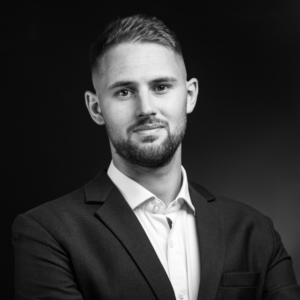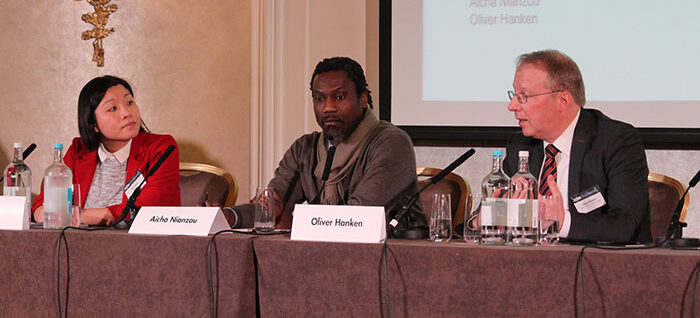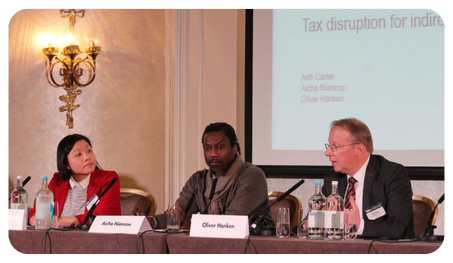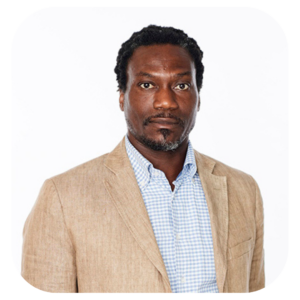Harvey John
Unit 2 Ferry Wharf
Hove Enterprise Centre
Basin Road North
Portslade, East Sussex
BN41 1BD
Time and time again, we’re asked by junior candidates what it takes to reach the senior grades within the indirect tax world. And rather than give you our answer, we thought it would be best if we shared the views of those who have been there and done it!
Aicha, thanks for joining us to share your experiences on our ‘Becoming’ series, which is aimed at providing advice for our tax leaders of the future! Before we get started, can you begin by telling tell us a few words about yourself?
Thanks for reaching out to me, Alex. So I currently lead the global indirect tax function for an international automotive company (almost $4B in sales, 20+ countries, and 14,000 employees), and here my role is primarily making sure we always stay compliant whilst also assessing and addressing the risks in our different regions around the world.
Thanks, Aicha! So, career-wise, where does the story start for you?
I’m originally from Côte d’Ivoire in West Africa (the country of the footballer, Didier Drogba!) and lived there until I was 18 years old, before relocating to France to complete my studies. After graduating with a degree in microelectronic engineering from the University of Montpellier (France), I started my career with GE in 2000 where I had the opportunity to work and live in six different countries (France, the US, the UK, Ireland, the Netherlands and Belgium) over 17 years.
Following my experience with IT roles – and my certification as a 6 Sigma Black Belt in quality – I decided to move to the tax technology department of GE. As a program leader in several big corporate tax technology projects, I gained the expertise which resulted in the move to my current role, Global Indirect Tax Director, two years ago.
That’s certainly very topical in today’s tax climate to start in an IT programme and move into Indirect Tax! What skills did you pick up as a graduate going into GE on a leadership program that has served you well today?
I had to go through a very thorough assessment process to be selected for the Information Management Leadership Program with GE. The two-year rotation program (four countries and four different GE businesses!) enabled me to learn a lot from different departments within GE. But, most importantly, it taught me to adapt quickly in a world that constantly changes as well as the importance of committing yourself to always deliver.
Despite this opportunity at GE being an IT-focused role, you eventually moved into a sole indirect tax position. How did the opportunity to move in tax come up?
During my time with the tax technology team, I got to a point where I became extremely frustrated not fully understanding some of the tax intricacies I was working on, so I decided to complete a Master’s in Taxation (sponsored by GE). It took me 4 years to complete it but it was a great experience as I could start to apply the courses I was learning in my tax projects.
Doing a Master’s in Taxation is certainly an admirable step toward alleviating the frustrations of not understanding tax intricacies. A big commitment indeed! It’s things like this that I’d imagine helped you in your journey to becoming a Global Indirect Tax Director. What would you say you did to put yourself in this position?
Of course. Throughout my career, I’ve constantly and actively looked for roles or projects that would present challenges and enable personal development. Even as an IT Senior Project Manager, I often asked to be involved in the different types of reporting obligations, compliance, or implementation projects (tax determination, provisions, compliance tools implementation, STAT to GAAP and VAT to STAT reconciliations) and, from doing that, spent a lot more time learning about the purely technical aspects of the indirect tax world (the directives, the difference between countries tax regulations, and so forth). You need to be constantly improving yourself.
Besides your Masters, were you active in self-education? Are you currently active in self-education?
Yes, absolutely – and not only in tax! What keeps me going is the notion that I can always learn and improve my skills. I spend a lot of time reading materials on finance and taxes (EU VAT directives- 2018, business review book on accounting, and tax planning).
I also try to meet and work with my peers as much as possible. For example, I’m part of the Tax Executive Institute and the Amcham (to name a few). Networking and collaborating with peers is another great way to improve my knowledge. But the most efficient way is always to be involved in real cases or projects (audits, litigations, due diligence, reporting obligations).
On the nonprofessional level, I’ve been playing the bass for 3 years and have taught myself simply by using the internet and books!
I completely agree with meeting peers and networking to share best practices and learn what others are experiencing! In fact, I recently saw you speak at ITR’s Tax & Technology Forum and you talked a lot about the future of the indirect tax function. What advice would you give to young professionals who want to work towards leadership within Indirect Tax & Tax Technology?
Tax is very complex and diverse – it’s an extremely technical world! With this, it’s key to stay connected and keep up to date. But in the current tax landscape, a genuine interest in technology is a must. It’s key to understand the basic concept of IT without necessarily being a complete geek (even though that would always be a plus!).
It’s also important to have a general understanding of the different types of tools available for tax determination and reporting, for example, Oracle, SAP, and various other ERP systems in general. By understanding this and the tax compliance processes, you must then maintain a close relationship with the IT function.
In terms of preparation for this, I’d suggest one makes sure they’re not afraid of trying different opportunities, whether these are different projects (specifically a few IT projects), different roles, even different businesses or different countries.
But the most important thing is to try to do (and not necessarily to be) your best in everything you do and always keep a positive attitude!
*Picture was taken by International Tax Review – ‘Aicha speaking on tax disruption for indirect tax compliance at ITR’s Tax & Technology Forum.’
Are there habits or skills that you think one needs to become a business leader in general?
Nothing matters more than knowing the technical aspects of taxation but there’s also the commercial aspect, where one should focus more on understanding the business side of things (the strategy and financial metrics) as well as appreciating how the top leadership functions in a company. By understanding this – paired with the ability to be clear and concise – you can translate complicated tax matters in a way the business can understand and support.
Ultimately, though, I believe that a good leader is someone who knows how to listen, share, and communicate simply and concisely, and has trust in their team.
One of the things that I’ve seen from our ‘Becoming’ series is that each leader we speak to approaches their day differently. What’s your daily routine?
I don’t have one! Every day is – and will always be – different. I’ve accepted this now. Plus, a daily routine would bore me!
Do you have any career inspirations or professionals that you look up to?
Most of them are not related to the tax world, but I’d of course say my family and my non-professional world are my first source of inspiration!
But it would be unfair not to mention the former Tax Technology Leader of GE – Stephen Francis. He’s a true mentor and has always been visionary in his leadership style, as well as being one of the original (and true) Taxologists.
Eventually, we’d love to create a reading list of books suggested by tax leaders. What books would you recommend to a budding tax professional?
- Sapiens: A Brief History of Humankind – by Yuval Noah Harari
- Debout-payé – by Gauz
- The Four Agreements: A Practical Guide to Personal Freedom – by Don Miguel Ruiz
Aicha, thank you so much for sharing your advice and experiences!
Are you at the senior level within Indirect Tax? If so, we’d love to hear about your experiences and share them with our global tax network. For more information, contact Alex.
Alex Mann is an Associate Director in the Tax Division at Harvey John.
Search our latest tax jobs.
If you would like to see our company updates and industry insights, follow our LinkedIn page.
Author

From boutiques to the Big 4, and start-ups to multinational corporations, Alex manages a diverse portfolio of clients worldwide which has enabled him to develop a vast global network of indirect tax and tax technology professionals in 40+ countries.










